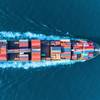At the recent Security Matters Seminar, held in London, sponsored by TT Club and organized by the publishers of Cargo Systems magazine, there was lively discussion focusing on the imminent U.S. Customs 24 Hour Manifest Rule and the IMO's amendments to Chapter XI of its Safety of Life at Sea (SOLAS) convention, which are due to be ratified next month. It fell to TT's
European Loss Prevention manager Andrew Webster to discuss the cost implications for European ports as a result of these additional security
demands.
In addition, Webster drew attention to opportunity for database cross-referencing that the 24 Hour Manifest Rule gives the U.S. authorities. "There is a real need for the Department of Homeland Security to reassess
its own security procedures," he said. Current plans are for US Customs to
use the 24-hour window they will now have to check shipper declarations made
on the manifests they receive from foreign ports. Webster contends, "Surely
by using this time to also cross-check company and individual identities with IRS, intelligence reports and other data at their disposal, the U.S. will improve the chances of detecting terrorist activity as well as assisting its
trading partners."
TT Club saw this interactive seminar as being of considerable assistance to its Members and the industry in general, both in terms of gathering
information on current security demands and in forming the operational procedures that must be developed in reaction to these demands. As
sponsors, the Club took care that the Seminar's speakers had the necessary authority to guide delegates correctly in the detail of the measures that U.S. Customs, the IMO and others are introducing.
In addition the format of the Seminar was designed so that delegates had
ample time to question the speakers. This facility was taken advantage of
to the fullest extent. Furthermore, John Nicholls, TT's Loss Prevention
Director lead a workshop exercise in order that the participants could work
together on developing practical solutions to some of the security risks,
which are increasingly occurring at the port hubs of the global supply
chain.
As regards the cost implications of these measures to ports, Webster
identified these as falling into two broad areas; physical and documentary
or systematic type. The former, which mostly relate to the amendments to
SOLAS, include improved terminal security with quality perimeter fencing and
secure gate controls being demanded. These measures additionally deter the
traditional thief as well as helping prevent acts of terrorism. Webster
pointed out the customer-facing advantages also. "As a facility presents a
safer outlook, increased customer confidence in the operation and increased
usage and profits result," he said.
During the Seminar much was said about the consequences to port operators of
the impending 24 Hour Manifest Rule, due to be imposed by US Customs next
month, whereby a vessels cargo manifest must be lodged no later than 24
hours prior to the vessel being loaded at a European port. Many see
difficulties and disruption as a result. However the message from Seminar
delegates was that there was a will to comply and, moreover, develop
efficient systems of documentary control to ensure that this security
measure has the desired effect of foiling acts of terrorism.
Webster discussed this crucial development within the documentary/systems
element of his presentation both supporting this positive view of the
challenges ahead and urging operators to see these new rules as, "a call for
more rigorous attention to detail and transparency of information, which
have a very positive effect on the supply chain as a whole." He listed
these advantages as: advanced knowledge for lines of their cargo; faster
customs clearance of goods at destination; better stowage and loading
information for stevedores and less cargo damage due to more care being
taken during the stuffing process.
He underlined that the Just In Time (JIT) system, which at first may seem
endangered by additional manifest demands, is in fact a planned production
methodology and that plans would now merely have to be adjusted to take
account of the 24-hour notification process. The so-called 'glass pipeline'
that is evolving within the global supply chain will be of great advantage
contended Webster. Additional cost will be incurred within the
transportation chain but he concluded, "A transparent system leads to
standardisation of documentation, which in turn leads to a more efficient
operation. Savings will also, therefore, result."
Sponsored Content
Anschuetz USA: Supporting the U.S. Maritime Industry

Maritime leaders unite to tackle ocean plastic with launch of new alliance: the Maritime Association for Clean Seas

Featured videos

Anschütz USA Opens

St. Johns Shipbuilding Shaped to Capture Government Shipbuilding Jobs

EBDG Expands into the Research Vessel Sector
December 2025
 Read the Magazine
Read the Magazine

 Read the Magazine
Read the Magazine
This issue sponsored by:

The Future of Alternative Fuels: The Fortescue Green Pioneer
Subscribe for
Maritime Reporter E-News
Maritime Reporter E-News is the maritime industry's largest circulation and most authoritative ENews Service, delivered to your Email five times per week








